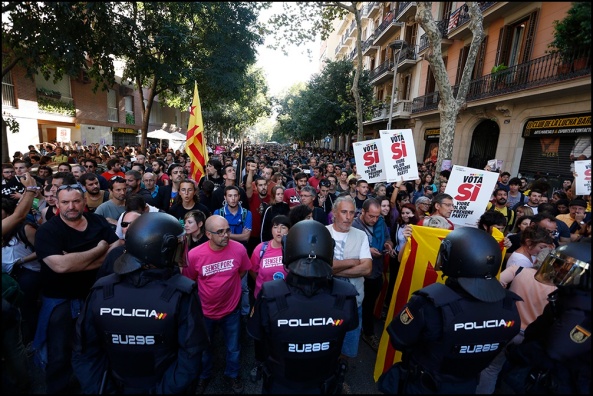When many nations in the EU come under pressure one suddenly realises how thin the democratic veneer is. This is of little surprise, as the principal raison d’être of the EU is economic, better said profits for large corporations – legal, immoral, and illegal.
This articles confirms information that has slowly been coming out, that the Catalans were not prepared for Spanish repression. Like so many, they believed in the democratic principles of the EU. This illusion was supported by the peaceful and democratic Scottish referendum. They are now in a race to create those civil structures necessary to form a nation – a democratic nation – as Spanish repression is not going to disappear soon and the Spanish army still stands in reserve. This has a tradition: Poder Popular.
David Whyte, is Professor of Socio-legal Studies at the University of Liverpool.
Cross-posted with kind premission from the website of the Centre for the Study of Crime, Criminalisation and Social Exclusion at Liverpool John Moores University

Photo by Oriol Clavera
If this blog was published in Spain, it would most probably be defined by the authorities as a “hate crime.” In the weeks following the Catalonian referendum, several people have been charged with criminal offences for posting facebook statements on police brutality and for daring to mention the violence of the Spanish National Police and the Guardia Civil in school classrooms. Those people have been charged with “hate crimes” against the police.
Those bizarre “hate crime” charges are a very clear indicator of the fragility of the state’s authority. Catalonia is a place in which the police and the criminal justice system has lost all legitimacy. The world knows now that Spain beats people up for trying to vote and that it jails elected politicians and civil society leaders for organising a referendum. The scenes that followed have shocked even the most hardened and cynical analysts of policing in Europe.
Of all of the brutal acts witnessed across the world, one stands out in terms of the undermining of police legitimacy. Amidst the dragging of men and women out of polling stations by their hair, the battering of the elderly and the truncheon-beatings dealt out to fire fighters, the police also fired live rounds of rubber bullets into the crowds. This act was particularly offensive, not just because of the sheer violence of it – firing live rounds at people who are merely trying to vote – but because rubber bullets are banned in Catalonia. Constitutionally the ban applies only to the Catalonian police, the Mossos.
Nothing could symbolize a totalitarian form of power more: a paramilitary occupying force, ignoring local laws and using weapons that are banned in the territory they have arrived to occupy.
Along with sections of the Army the Spanish police were already regarded in Catalonia and many other regions as a last bastion of Francoism, the Spanish National Police and the Guardia Civil now have no legitimacy whatsoever, in any section of the community. This creates an interesting situation. In the coming weeks and months, as the constitutional crisis no doubt rumbles on, the sovereign state will have a police force without any legitimacy.
The question of policing had symbolised the constitutional crisis in the weeks running up to the referendum when the Spanish government effectively launched a coup against the Catalonian government and took unilateral control of the Mossos. When both the government and the head of Mossos defied their orders, the police force fell into an unprecedented exceptional position. It found itself in, quite literally, what Georgio Agamben would call a zone of indistinction in which the normal constitutional order is completely paralysed. Even now, with a new command structure imposed by Spain, it is not at all clear whose orders the Mossos are following. Catalonia is a place in which the role and function of the police is literally up for grabs.
The power and reach of the ‘Committees to Defend the Referendum’ (CDRs) that built the mass participation to resist the police should not be under estimated. Those CDRs grew up organically in perhaps 2,000 neighbourhoods across Catalonia to occupy the polling booths and barricade them against the Guardia Civil. Many of the CDRs were also instrumental in building the general strike in the week following the referendum that saw 2 – 3 million people on the streets.
The social movements and the left trade unions are now seeking to develop the structure of the CDRs into a new ‘Social Assembly of Catalonia’ that can harness this popular power. The idea is that this Social Assembly, with roots in the neighbourhoods can move from defending the right to vote, to something much more significant: the development of an alternative social and economic agenda in preparation for the coming republic. What has been a mechanism to mount a popular defense against police brutality may well become a network of ‘committees to defend the local economy.’
This is a movement that has crucially been given impetus by civil disobedience and direct confrontation with the police. Involving people of all ages and, people from a range of different social and political backgrounds. It is now being given impetus by a mass movement demanding the release of the political prisoners.
The theoretical foundation of the global prison/criminal justice abolition movement around the world is concerned not just with ‘abolition’ of prisons or criminal justice intervention per se, but with reframing the entirety of the social relationships that produce punitive and oppressive outcomes. By linking community defence mechanisms, based on the principle of civil disobedience to a social and economic agenda, what is happening in Catalonia may well turn out to be an important historical moment in abolitionism.


Be the first to comment